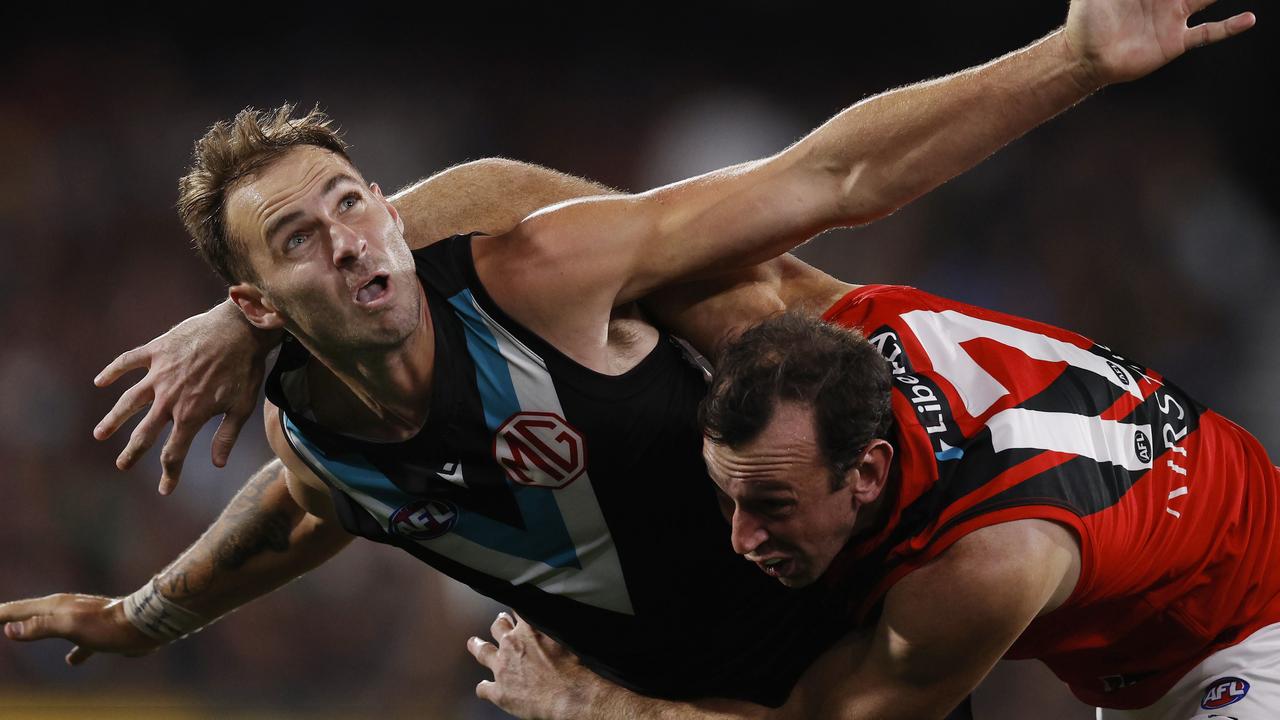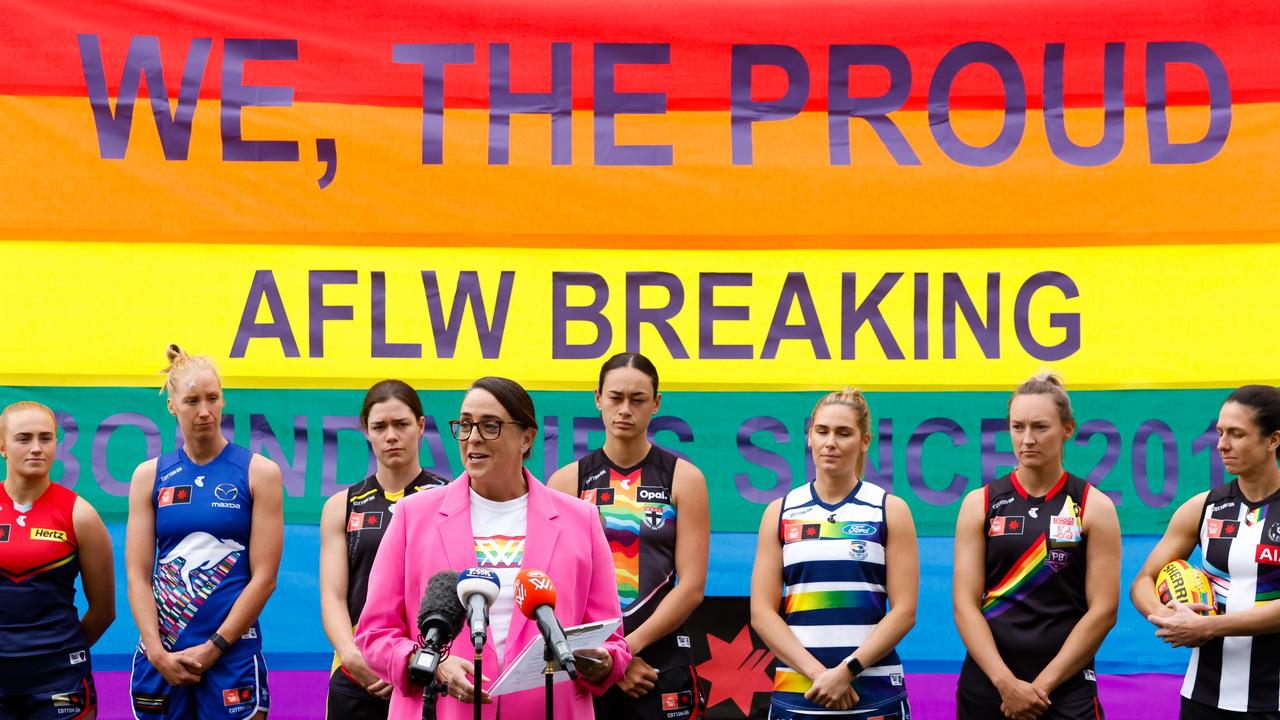Jeremy Finlayson must cop a ban for homophobic slur, or expose AFL’s double standard | Emily Olle
There isn’t a single openly gay player in the AFL – and the response to Finlayson’s comments shows why. The AFL now has a critical decision to make, writes Emily Olle.
Each weekend, up to 400 male AFL players will run out onto grounds across the country. To date, not a single one of them has come out publicly gay or bisexual.
The AFL remains the only major sporting league in the world without an openly gay male competitor.
When top-tier players are throwing the f-slur at their opponents in the middle of a game, it’s easy to see why.
Power forward Jeremy Finlayson is under AFL investigation after he admitted to aiming an offensive term at an Essendon player in Friday’s game at Adelaide Oval – and the response has, thus far, been unsurprisingly poor.
Port Adelaide president David Koch came out swinging in defence of his player, praising Finlayson’s contrition and urging the AFL to show leniency in its punishment.

Koch has come under fire for his blokey, out-of-touch commentary, with many rightly slamming his poor defence of Finlayson’s words as in “the heat of battle” and a “niggle”.
He also said Finlayson’s immediate move to report the slur should be applauded. Premier Peter Malinauskas and AFL CEO Andrew Dillon have said similar.
“People make mistakes, we all do as human beings … I think it’s a great credit to Jeremy that he has apologised quickly, he owned up to the mistake he has made and I think that’s an action of someone who has done the wrong thing and acted with integrity following it,” Mr Malinauskas said.
But the word was picked up by the umpires’ microphone and called out by Essendon players – so what choice did he have?
In 2021, Crows forward Taylor Walker was handed a six-week ban after aiming a racial slur towards SANFL player Robbie Young.
But Koch was adamant Finlayson’s slur and Walker’s punishment weren’t comparable.
He said the “benchmark had been set” when the AFL handed a $20,000 fine to North Melbourne coach Alastair Clarkson after allegedly using the word “c***sucker” during a quarter-time outburst - now the second homophobic slur hurled in the space of a month, and a paltry punishment for it.
For his part, Finlayson is yet to front the media. In a pre-recorded video shared by Port Adelaide, Finlayson said the word he used was “very unacceptable in the game” and he was “getting all the education I can to make myself better”.
Education, education, education. The word rolled out each time these things happen within the AFL. Education is an important part of learning and healing – but it won’t stop bad behaviour at its core.
How much more education do you need to know “f*****” is offensive?
Racist incidents disgracefully still occur – but, while there is a long way to go, the league, and its clubs, have shown through action that racism has no place in the game.
The same can’t be said for homophobia, which remains shamefully unpunished in the football world.
It’s well-known within AFL circles that there are players who identify as gay.
But, despite mounting pressure, officials seem to still be reluctant to discuss why male players remain so fearful to share their sexuality publicly.
The AFLW has a dedicated Pride Round – but the men’s competition still has nothing of the sort.

The AFL’s own diversity, inclusion and culture policy says the league is committed to “ensuring the sport is welcoming and safe for everyone who wants to participate, including people within the LGBTIQA+ community”.
To prove that’s not just lip service, the AFL now has a decision to make.
Misogynistic, homophobic or racist – a slur is a slur, and Finlayson’s punishment must reflect a commitment to stamping out all forms of discrimination.
The Adelaide Crows’ dedicated LGBTQI+ supporter group perhaps put it best when they said this type of “casual” homophobia is what prevents people from attending AFL matches or even joining their local community club.
I’ve had the pleasure of meeting the Rainbow Crows on multiple occasions. They’re a tough, bright and passionate bunch who love their footy. But even the most solid foundations start to crack if you chip away hard enough.
“Harmless” incidents of vilification occur every day to marginalised communities. They might be an offhanded slur at a family BBQ, a workplace gibe, a “silly” impression – or a comment at an AFL game.

“A lot of people say that it should be brushed off and that we should not be affected by just words,” the Rainbow Crows wrote in a statement.
“Maybe those people have never experienced what some in our community experience everyday in their work and personal lives and on social media.
“Maybe they might just be those on the other end of it instead?”
How do Port Adelaide’s gay supporters – or players – feel to know one of their top players has the “f” slur front of mind in the “heat of battle”? How do they feel that their president has all-but defended it?
I’m with Robbo on this one. Further, a fair contingent of #AFLW players - including at Port - are members of the LGBTIQ+ community. Their own W senior coach, even. Can’t imagine what the last few days has been like for them. https://t.co/qrCIYsVpro
— Lauren Wood (@LaurenHeraldSun) April 8, 2024
There will of course be fans rioting if Finlayson is, like Walker, handed a multiple-match ban for his words. But change starts from the top.
If the AFL is serious about diversity and inclusion, that must mean creating a safe space for all.
Finlayson’s punishment must reflect that handed down to Walker. Anything less exposes a double standard – and sends a clear message to the code’s LGBTQI+ fans and players: We don’t take you seriously.





